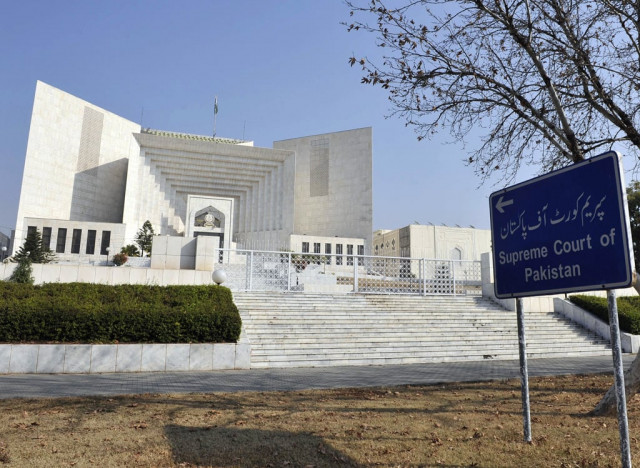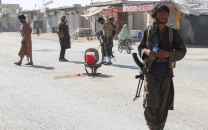Larger bench recommended for considering effects of compromise in criminal matters
Justice Isa has declared that when a compromise is accepted, it brings to an end the punishment of the offence

PHOTO: AFP
Justice Qazi Faez Isa in his recent judgment has declared that when a compromise is accepted, it brings to an end the punishment of the offence, but it does not simultaneously result in setting aside of the conviction and acquittal of the convict. Another Supreme Court judge — Justice Yahya Afridi — also supported his view.
Both the justices in the 22-page judgment opposed the view of a three-judge bench led by Justice Asif Saeed Khosa that on June 30 had declared that a convict will get all the benefits and fruits of a lawful acquittal on the basis of a compromise with legal heirs of a victim in criminal matters.
The controversy arose in March 2017, when Justice Qazi Faez Isa differed with the majority opinion on this point and said a compromise with the heirs in criminal matters ‘cannot affect the conviction’.
Top court to announce verdict in Aasia Bibi case tomorrow
Later, the chief justice had referred the matter to the three-judge bench for giving a final opinion. Justice Khosa in the majority opinion said the court appreciates the intensity and sincerity of the sentiment expressed by Justice Isa but could not agree with “his lordship so as to interpret the existing law in the light of some hypothetical possibilities in this world and retribution or redemption in the hereafter”.
However, the matter has yet to end as the two judges in a recent judgment, authored by Justice Isa had said that a number of provisions were not considered by the bench led by Justice Khosa in the judgment, and most probably because the requisite assistance was not provided by law officers.
Justice Isa in his recent verdict says that they agree that by accepting the compromise it brings the sentence to an end, we are of the view that the convict does not secure an automatic acquittal as a consequence.
Therefore, it is all the more important that every aspect of the matter is thoroughly examined and determined. Consequently, we refer this case to the Hon’ble Chief Justice for the constitution of a larger bench, says the judgment authored by Justice Isa and endorsed by Justice Afridi. However, Justice Gulzar Ahmad, who was heading the bench opposed both judges view and endorsed the opinion of three judges led by Justice Khosa. In view of prevailing situation, majority view led by Justice Khosa will prevail.
Hudaibiya Paper Mills case: Top court throws out NAB’s review plea
The judgment says that applying for employment a pardoned convict need not disclose his conviction, including when seeking employment in respect of role model positions, of a teacher or in respect of sensitive jobs or where moral integrity is an employment prerequisite. An acquittal is also stated to be a “double presumption of innocence”.
“It may be said that thieves and murderers do not serve society. Hiring or retaining a thief or a murderer as a cashier, teacher, policeman or judge would be irresponsible and dangerous”
The ruling says that the victim of a crime can pardon/forgive the person who has wronged him/her. The dead however can neither pardon nor forgive. Pain and suffering is caused to the heirs of a murdered person and the Holy Qur’an empowered them to forgive the murderer.
“Forgiveness is premised on guilt having been established and or acknowledged. The Holy Qur’an does not state that if a murderer is pardoned/forgiven he stands exonerated or “acquitted” of the crime or to use the language of the SMC judgment (authored by Justice Khosa)”
The court said that murder and serious offences can not be compounded in Commonwealth countries, in European countries and the United States of America (“USA”), countries of which legal precedents, in the absence of local precedents, are referred to by this court.
These countries have considered the scope and effect of a pardon by the executive (the Head of State or other designated authority), therefore, the analogous principles derived from the use of an executive pardon may be relevant.
Forgiveness (tawbah) is premised upon seeking it. “And He [Allah] is the One that accepts repentance (tawbah) from His slaves and forgives.” Tawbah is not sought for something not done. The wrongdoer may seek forgiveness from the person wronged. Forgiveness is not sought by the innocent. Forgiveness is premised on the acknowledgment of the wrong, which in a case of murder means admitting having committed the murder. It is our understanding that forgiveness or pardon does not erase or obliterate the crime, it simply withholds the punishment. The Qur’an negates the concept of obliteration of the crime, even if it has been forgiven, and its repetition attracts punishment.
“In our opinion neither Islam, nor the law, permits such largesse to be bestowed upon a murderer who has taken a sacred. It is more than a sufficient benefit when the murderer is no longer imprisoned and is set free”
The judgment says that we have not been able to discover any provision either in the PPC or the Code which explicitly, or impliedly, mandates that a convict’s conviction shall be set aside when the compromise is accepted. Nor, in our opinion, can this be done by relying on subsection (6) of section 345, which states that the composition, “shall have the effect of an acquittal”.



















COMMENTS
Comments are moderated and generally will be posted if they are on-topic and not abusive.
For more information, please see our Comments FAQ